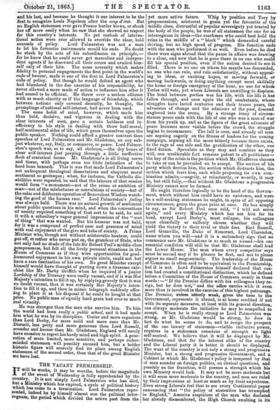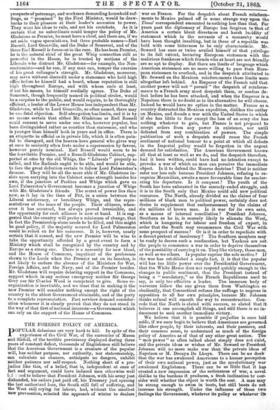THE VACANT PREMIERSHIP.
TT will be weeks, it may be months, before the magnitude of the event of Wednesday is fully apprehended by the country. It is not simply Lord Palmerston who has died, but a Ministry which has expired, a cycle of political history which has come to a termination. Lord Palmerston repro- Suited, indeed he by himself almost was the political inter- regnum, the period which divided the active past from the yet more active future. Whig by position and Tory by prepossessions, aristocrat in grain yet the favourite of the middle class, distrustful of popular sovereignty yet trusted by the body of the people, he was of all statesmen the one for an
interregnum in ideas—the coachman who could beat hold the reins in the middle of a " block " which demanded careful
driving, but no high speed of progress. His function ends with the man who performed it so well. Even before he died there were signs abroad that the pause in affairs was drawing to a close, and now that he is gone there is no one who could fill his special position, even if the nation desired to see it filled. There is no one on whom his mantle has descended, no one who can rule, and rule satisfactorily, without appeal- ing to ideas, or exciting hopes, or moving forward, or moving backwards, or doing anything except meet skilfully the home or foreign emergency of the hour, no one for whom Tories will vote, yet whom Liberals are unwilling to displace. The bond between parties was his life, with his life it has fallen through, and once again the old combatants, whose struggles have lasted centuries and their truces years, the advocates of change and the admirers of the past, descend ungloved into the arena. By a strange irony of circum- stances peace ends with the life of one who was a man of war from his youth up, and as the figure of the great advocate of peace becomes more visible before the crowd, the struggle begins to recommence. The lull is over, and already all men are arguing eagerly on the fitness of leaders for the coming campaign, arguing all the more bitterly because there exists, to the rage of one side and the gratification of the other, one fixed datum. Speculate as they may and combine as they will, one unalterable fact remains patent to all politicians— the key of the crisis is the position which Mr. Gladstone chooses to take or can be prevailed on to accept. The section of his party which decries him, the section which distrusts him, the section which fears him, each while proposing its own com- bination admits,—angrily, or reluctantly, or wearily, it may be, but still fully,—that without Mr. Gladstone a progressive Ministry cannot now be formed.
He ought therefore logically to be the head of the Govern- ment, which without him could have no existence, and were be a self-seeking statesman he might, in spite of all opposing circumstances, grasp the great prize at once. He has simply to say, as Sir Robert Peel once said, " I will not serve again," and every Ministry which has not him for its head, except Lord Derby's, must collapse, his colleagues must cheerfully or sullenly choose whether they will yield the victory to their rival or their foes. Earl Russell, Lord Granville, the Duke of Somerset, Lord Clarendon, name whom you will—and it is a melancholy sign that no commoner save Mr. Gladstone is so much as named—his one essential condition will still be that Mr. Gladstone shall lead the Lower House. The man whom every competitor says must be second may if he pleases be first, and not to please argues no small magnanimity. The leadership of the House of Commons is often said to be equivalent to the Premiership, but it is not. Lord Palmerston himself declared that cus- tom had created a constitutional distinction, which he defined before a Committee of the House of Commons nearly in these words :—" If the Premier differs with his colleagues they re- sign, but he does not," and the office carries with it even more than is involved in the exercise of this highest patronage. The Premier, unless utterly weak, gives the tone to the Government, represents it abroad, is at home credited if not with its separate measures, at least with its general direction, can always moderate the initiative he may be compelled to accept. When he is really strong as Lord Palmerston was strong, as Mr. Gladstone would be strong, he does in fact do what he seems to do, and to resign the prospect of the one luxury of statesmen—visible initiative power, requires in a statesman conscious of strength no light self-control. We believe that it will be displayed by Mr. Gladstone, and that for the interest alike of the country and the Liberal party it is better it should be displayed. The want of the country is not only a strong and progressive Minister, but a strong and progressive Government, and a Cabinet in which Mr. Gladstone's policy is tempered by that of men sounder on foreign politics, on clerical questions, and possibly on the franchise, will possess a strength which his own Ministry would lack. It may not be more moderate but it will seem more moderate to the country, and men are ruled by their impressions at least as much as by their experience. Even strong Liberals feel that to see every Continental paper announcing that "the policy of abstention has triumphed in England," America suspicious of the man who declared her already dismembered, the High Church exulting in its frage, as " promised" by the First Minister, would be draw- backs to their pleasure at their leader's accession to power. They want his ideas to rule, and not his crotchets. As it is certain that no subordinate could temper the policy of Mr. Gladstone as Premier, he must have a chief, and there are, if we Bet aside vague speculations, but three probable names—Earl Russell, Lord Granville, and the Duke of Somerset, and of the three Earl Russell is foremost in the race. He has been Premier, he is the natural chief of the great Whig connection still so powerful in the House, he is trusted by sections of the Liberals who distrust Mr. Gladstone—for example, the Non- conformists—and he can, if any man can, temper the exercise of his great colleague's strength. Mr. Gladstone, moreover, may serve without discredit under a statesman who held high office before he himself had a beard, whose reputation is still high throughout Europe, and with whose ends at least, if not his means, he himself cordially agrees. The Duke of Somerset, though frequently named in political circles, would be a surprise to the public, and would require, to be thoroughly efficient, a leader of the Lower House less independent than Mr. Gladstone, while to Lord Granville, so often named, there may be one fatal objection. Self-abnegation has limits, and it is by no means certain that either Mr. Gladstone or Earl Russell could consent to serve under one who, however popular, has been distinguished rather as courtier than statesman, and who is younger than himself both in years and in office. There is an etiquette in official as in private life, which it is often pain- ful to disregard, and the heaven-born general who gives way at once to seniority often frets under a supersession by favour, however purely nominal. Earl Russell would seem to be the inevitable Premier, and a Russell-Gladstone Cabinet, sup- ported at cuioe by the old Whigs, the "Liberals" properly so called, and the Radicals ought to be able, and would be able, to face the great defection certain to follow Lord Palmerston's decease. They will be all the more able if Mr. Gladstone in- sists upon carrying into the Cabinet some strength besides his own, if the junction of Peelites and Whigs which gave us Lord Palmerston's Government becomes a junction of Whigs with Mr. Gladstone's friends. The secret of power lies there now, as it lay in the time of Pitt, in a union between the Liberal aristocracy, or hereditary Whigs, and the repre- sentatives of the mass of the people. Their alliance, when- ever it has occurred, has always proved irresistible, and the opportunity for such alliance is now at band. It is sug- gested that the country will prefer a minimum of change, that in fact the Premiership alone needs to be filled, and this might be good policy, if the majority secured for Lord Palmerston could be relied on for his successor. It is, however, nearly certain that it cannot, and the new Premier will be wise to take the opportunity afforded by a great event to form a Ministry which shall be recognized by the country and by Europe as a strong one. There is a necessity for new blood, and the House of Commons, impatient of the preference shown to the Lords when the Premier sat on its benches, is not likely to endure the absence of the Ministers for War, Foreign Affairs, and the Navy, and of the Premier besides. Mr. Gladstone will require debating support in the Commons, support which in any serious emergency neither Sir George Grey nor Sir Charles Wood is competent to give. Some re- organization is inevitable, and we trust that in making it the new Premier will consider nothing except the right of the country to the ablest Government obtainable, and of the party to a complete representation. Past services demand consider- ation whenever it is clearly proved that they do not stand in the way of that first of national interests—a Government which can rely on the support of the House of Commons.































 Previous page
Previous page